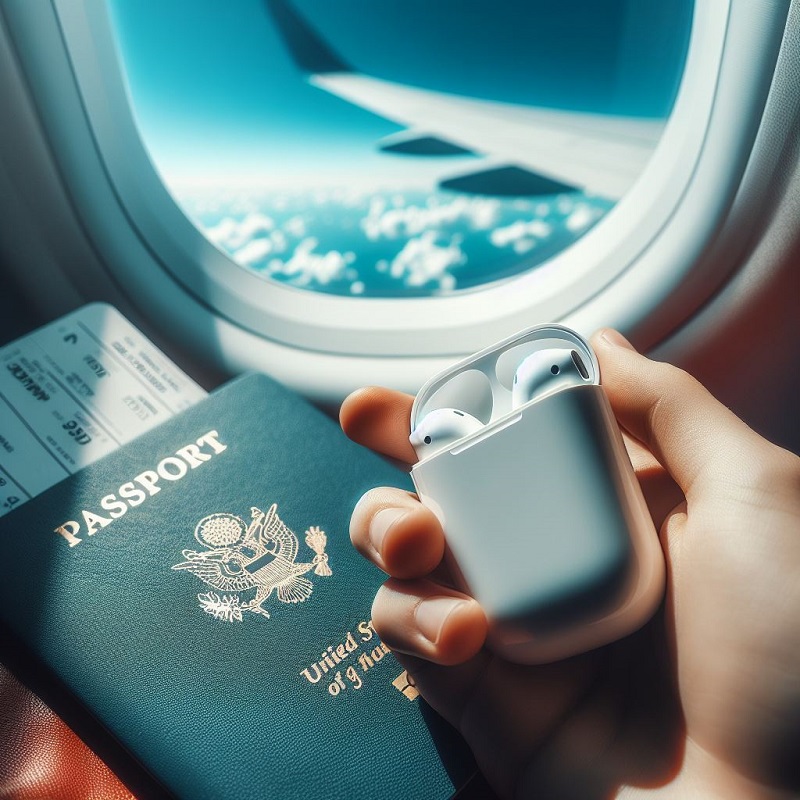Air travel has become an essential part of modern life, and with it comes the need to understand airline regulations, particularly when it comes to electronic devices like AirPods. Whether you’re a frequent flyer or a first-time traveler, knowing what you can and cannot bring on a plane can help ensure a smooth journey from check-in to landing.
Can You Bring AirPods on a Plane?
Yes, you can bring AirPods on a plane. AirPods are allowed in carry-on luggage or in your pocket during the flight. However, it’s always a good idea to check with the airline’s specific rules and regulations regarding electronic devices before you travel.
Additionally, during takeoff and landing, electronic devices including AirPods may need to be turned off or put in airplane mode as per the airline’s instructions for safety reasons.
Airline Policies on Electronics
Before packing your bags, it’s crucial to familiarize yourself with airline policies regarding electronic devices. While regulations may vary slightly between airlines, there are common guidelines that apply across the board. When it comes to AirPods specifically, most airlines permit passengers to bring them on board as part of their carry-on luggage.
TSA Guidelines for AirPods
The Transportation Security Administration (TSA) oversees security screening at airports in the United States. According to TSA guidelines, AirPods are considered personal electronic devices and are typically allowed through security checkpoints. However, like all electronic devices, they must undergo screening, which may involve removing them from your carry-on bag for inspection.
Battery Safety Concerns
One important consideration when traveling with AirPods is battery safety. To avoid any issues during your journey, it’s essential to ensure that your AirPods are fully charged before departure. Additionally, be sure to store them properly when not in use and avoid exposing them to extreme temperatures, which can affect battery performance.
Storage and Usage During the Flight
During the flight, you can typically wear your AirPods and use them for entertainment purposes, such as listening to music or watching movies. However, it’s essential to follow the crew’s instructions regarding electronic devices, especially during takeoff and landing. Be prepared to stow your AirPods if requested by the flight attendants.
Tips for Smooth Travel
To make your travel experience with AirPods as seamless as possible, consider taking some precautions. Keep your AirPods easily accessible for security screening, and consider investing in a protective case to prevent damage during transit. It’s also a good idea to download your favorite music or podcasts before your flight to ensure uninterrupted entertainment.
International Travel Considerations
When traveling internationally, be aware that airline policies and security procedures may vary from country to country. Some countries may have additional restrictions on electronic devices, so it’s essential to research and familiarize yourself with the regulations of your destination beforehand.
Common Misconceptions
There are several misconceptions surrounding the use of AirPods on planes, such as concerns about interference with aircraft systems or restrictions on wireless devices. However, these concerns are largely unfounded, as AirPods are designed to comply with safety standards and regulations set by aviation authorities.
Customer Experiences
Many travelers have shared positive experiences using AirPods during their flights, citing convenience, comfort, and superior sound quality as key benefits. While individual experiences may vary, AirPods have become a popular choice for air travel due to their wireless design and compact size.
Alternatives for AirPods
If you prefer not to travel with AirPods, there are plenty of alternative wireless earbuds or headphones available on the market. When choosing a travel-friendly option, consider factors such as battery life, noise cancellation features, and compatibility with in-flight entertainment systems.
Future Trends and Developments
As technology continues to evolve, we can expect to see advancements in wireless audio devices and improvements in airline policies regarding electronic devices. From enhanced battery life to seamless connectivity, future innovations may further enhance the travel experience for passengers with AirPods and similar devices.
Environmental Impact
While electronic devices like AirPods offer convenience and entertainment during flights, it’s essential to consider their environmental impact. From manufacturing to disposal, electronic waste poses significant challenges to sustainability. As conscientious travelers, we can minimize our ecological footprint by choosing durable products and recycling old devices responsibly.
Conclusion
In conclusion, bringing AirPods on a plane is generally allowed and can enhance your travel experience by providing wireless entertainment and convenience. By following airline regulations and taking necessary precautions, you can enjoy your journey with peace of mind, knowing that your AirPods are safely packed and ready to use.
FAQs
Can I wear AirPods during takeoff and landing?
Yes, you can typically wear AirPods during takeoff and landing, but be prepared to follow crew instructions if asked to remove them.
Are AirPods allowed in carry-on luggage?
Yes, AirPods are allowed in carry-on luggage, but they must undergo security screening like all electronic devices.
Do I need to remove AirPods during security screening?
You may be asked to remove AirPods from your carry-on bag for inspection during security screening.
Can I use AirPods during the entire flight?
You can use AirPods for the duration of the flight, but be mindful of crew instructions and any restrictions on electronic devices.
Are there any restrictions on AirPods for international flights?
Regulations regarding electronic devices may vary for international flights, so it’s essential to check the policies of your airline and destination country before traveling.
